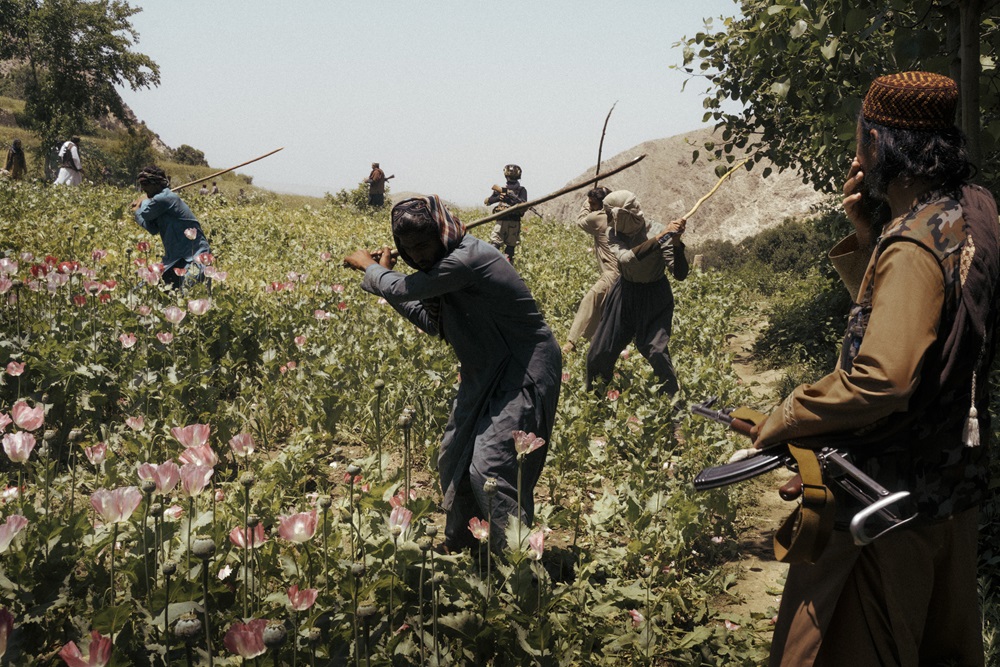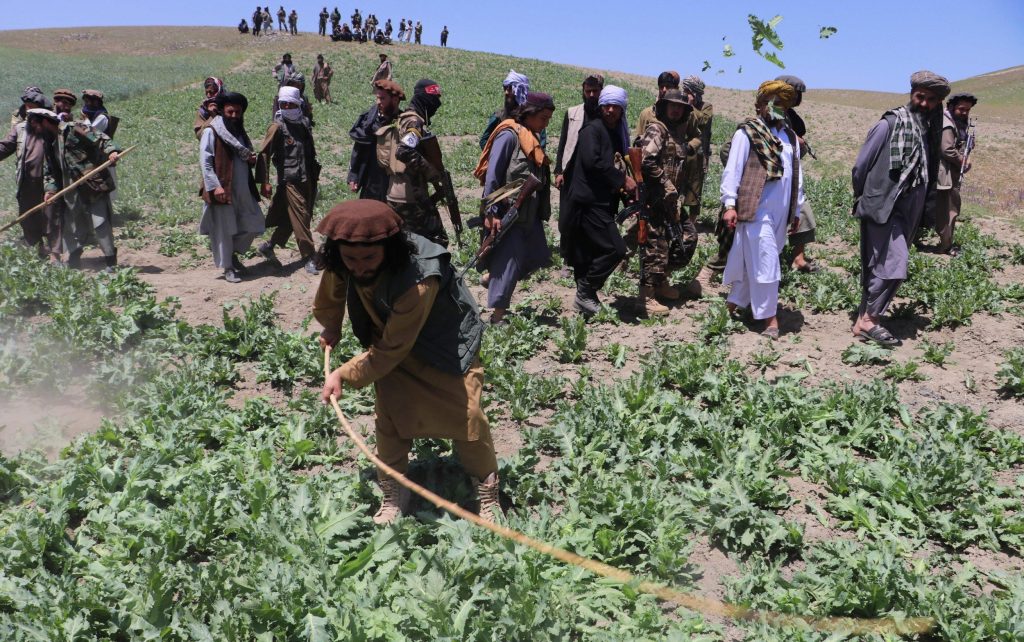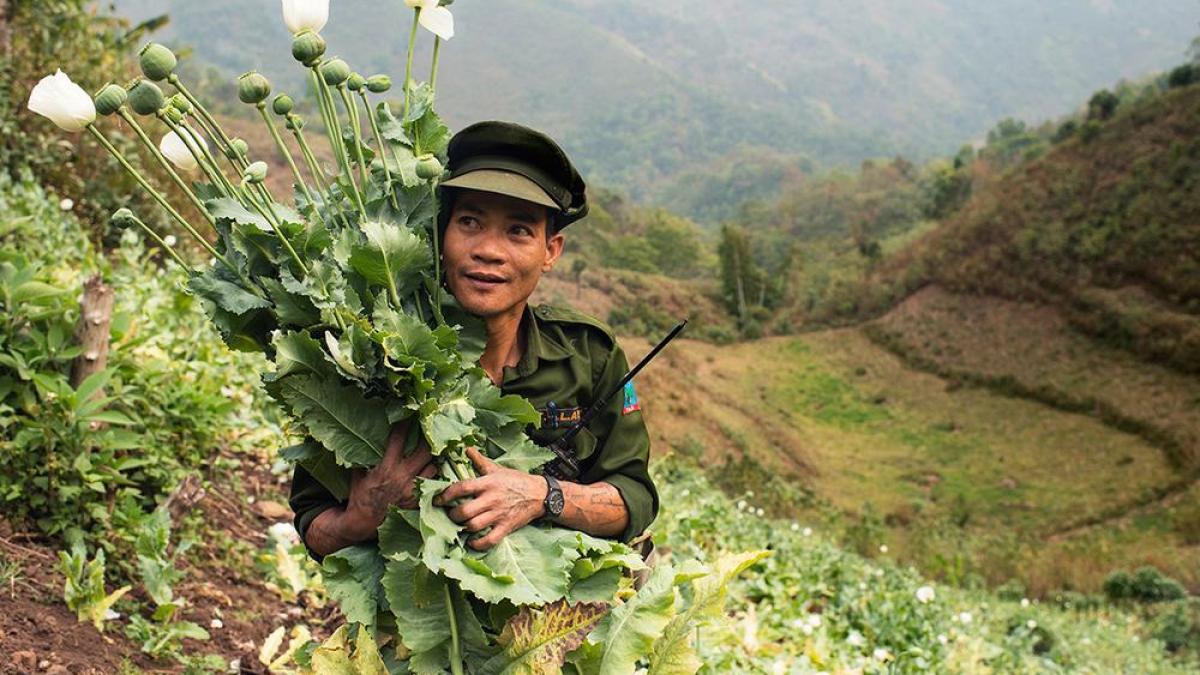News Asia
Opium Poppy Cultivation in Afghanistan Decreases 95% Under the Taliban

The United Nations reports that opium poppy cultivation in Afghanistan, which was once the leading supplier globally, has decreased dramatically since the Taliban banned the practise a year ago.
The United Nations Office on Drugs and Crime (UNODC) reported that opium cultivation in the entire country decreased by 95% to 333 tonnes in 2023, from 233,000 hectares the year before to 10,800 hectares (26,700 acres).
According to UNODC, this was exerting pressure on farmers in the war-torn nation where agriculture sustains the majority of the population, and at times, the value of poppy exports exceeded the value of all formal exported products.
The report stated that the precipitous decline could have significant economic repercussions in a country where approximately two-thirds of the population already requires humanitarian assistance.
“Afghanistan is in critical need of substantial investments in sustainable livelihoods to provide Afghan farmers with alternatives to opium poppy in the coming months,” Ghada Waly, executive director of UNODC, said in a statement.
“This presents a real opportunity to build towards long-term results against the illicit opium market and the damage it causes both locally and globally.”
The substantial reduction in opium supply from Afghanistan, which is believed to provide approximately 80% of the world’s illicit opium, could ultimately result in a decline in opium use worldwide. However, it also posed a threat of an increase in the global prevalence of substitutes like fentanyl or synthetic opioids, according to the UNODC.
The interior ministry issued a directive in April 2022 to eradicate any lingering narcotics crops, in direct opposition to the prohibition of such activities by the paramount spiritual leader of the Taliban. As they sought international legitimacy during their previous regime, the Taliban outlawed poppy cultivation in 2000, but they confronted a backlash from the general populace, according to experts.
Southern Helmand, among other provinces where the Taliban have historically enjoyed substantial support, is rife with opium poppy plantations. According to the UNODC, numerous producers had shifted to wheat cultivation, despite the fact that it paid considerably less than poppy.
UNODC Reports – Major opium poppy economy expansion underway in Myanmar
The United Nations Office on Drugs and Crime (UNODC) opium survey for Myanmar has found that cultivation has increased significantly, reversing the downward trend of 2014 to 2020.
The report announced today “Myanmar Opium Survey 2022: Cultivation, Production and Implications” has analysed data collected during the first full growing season since the military takeover, showing an increase of 33% in cultivation area to 40,100 hectares, and an 88% increase in potential yield to 790 metric tonnes. Following a moderate increase in cultivation area of 2% and yield of 4% during the 2021 season, the 2022 results confirm a significant expansion is underway of Myanmar’s opium economy.
UNODC Regional Representative Jeremy Douglas remarked, “economic, security and governance disruptions that followed the military takeover of February 2021 have converged, and farmers in remote often conflict prone areas in northern Shan and border states have had little option but to move back to opium.”
The most significant increases were registered in Shan State where cultivation went up 39%, followed by Chin and Kayah states which increased 14% and 11%, while cultivation in Kachin rose a moderate 3%. The average estimated opium yield also increased by 41% to 19.8 kg/ha – the highest value since UNODC started measuring it in 2002 – pointing to increasingly sophisticated farming practices and availability of fertilizers.
The average price paid to farmers increased by 69% in 2022 to about US$280/kg even as the supply surged, demonstrating the attractiveness of opium poppy as a crop and commodity, and strong expanding demand as the Golden Triangle opium and heroin trade appears to be reconnecting to the global market.
Combined with higher production, farmers earned more than twice as much from opium poppy as in the previous year, although the jump in income did not necessarily translate directly into purchasing power as the country has experienced soaring inflation, a devalued currency, and increasing costs of fertilizers and fuel.
The increase in opium has taken place at the same time that the production of synthetic drugs has continued to expand, with the drug economy in the country and surrounding region generating substantial profits. The value of opium poppy in Myanmar ranges up to US$2 billion, with the regional heroin trade valued at approximately US$10 billion.
Representative Douglas added, “the growth we are witnessing in the drug business is directly connected to the crisis the country is facing. The impact on the region is profound, and the country’s neighbours need to assess and candidly address the situation, and they will need to consider some difficult options.”
Solutions need to take into account the challenges and vulnerabilities faced by people living in traditional opium poppy cultivating areas, including isolation and conflict. UNODC works with these realities in-mind, supporting communities and farmers to strengthen local livelihoods that can compete with the opium economy.
“At the end of the day, opium cultivation is really about economics, and it cannot be resolved by destroying crops which only escalates vulnerabilities,” commented Benedikt Hofmann, UNODC Country Manager for Myanmar. He added, “Without alternatives and economic stability it is likely that opium cultivation and production will continue to expand.”
Click here to download the full report.

































